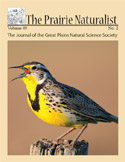Great Plains Natural Science Society

The Prairie Naturalist
Date of this Version
6-2010
Document Type
Article
Citation
The Prairie Naturalist· 42 (1/2): June 2010, pp 32-37
Abstract
Our objective was to describe the influence of population dynamics, inter- and intra-specific competition, predation, prey abundance, and prey size structure on yellow perch (Perca flavescens) growth for two perch population types (high-quality and low-quality) commonly found in South Dakota glacial lakes. We selected Lake Cochrane as a low quality yellow perch population and Lake Madison as a high quality perch population. Sunfish (Lepomis spp.) relative abundance was greater (P < 0.05) in Lake Cochrane than Lake Madison, suggesting interspecific competition may have a large influence on yellow perch growth. Indices of available sizes and densities of zooplankton were lower (P < 0.05) in Lake Cochrane than Lake Madison, suggesting that increased competition for large zooplankton may have reduced zooplankton size structure and density. Zooplankton may be a limiting resource in South Dakota glacial lakes when both yellow perch and sunfish are feeding primarily on zooplankton which may explain differences in perch growth rates between population types .
Included in
Biodiversity Commons, Botany Commons, Ecology and Evolutionary Biology Commons, Natural Resources and Conservation Commons, Systems Biology Commons, Weed Science Commons

